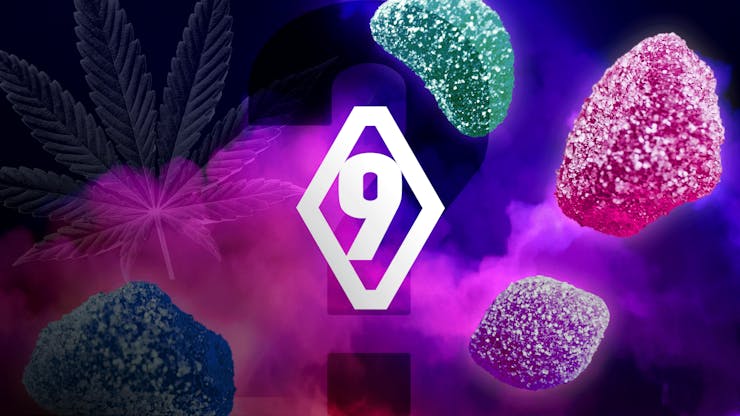In recent months, cannabis consumers have come across an intriguing line of cannabinoid products online and on smoke shop shelves: Hemp-derived delta-9 THC edibles.
Yep. Even in states without access to legal weed, people can buy goodies—primarily gummies, but baked goods and other edibles, too—that contain bona fide THC.
How the heck is that possible?
From its origins in hemp and “mother liquor,” to the crazy legal loophole that makes it all possible, read on to learn more about hemp-derived delta-9 THC.
Turning hemp into ‘mother liquor’
The hemp-derived cannabinoid market exploded in late 2018, when Congress legalized hemp via the US Farm Bill.
The bill defines hemp as any cannabis sativa plant that contains less than 0.3% THC. Many consumers associate hemp with the non-psychoactive cannabinoid CBD, which can easily be extracted from the plant.
But the Farm Bill gave manufacturers a surplus of hemp that they could convert that CBD, and then, in turn, into one of many psychoactive cannabinoids, such as delta-8 THC, delta-10 THC, HHC, or THC-O acetate.
Hemp-derived delta-9 THC similarly comes from CBD.
As the veteran cannabinoid scientist James Stephens tells Leafly, when you crystallize and extract CBD from hemp, you’re left with a liquid byproduct known as “mother liquor.”
That tasty brew contains a mixture of naturally-occuring minor cannabinoids from the extraction process, including delta-9—actual THC.
Stephens explained that mother liquor is the key to making delta-9 THC edibles. He believes that 95% of manufacturers simply toss the liquid into their delta-9 gummies and don’t bother to isolate the THC any further.
Shop highly rated dispensaries near you
Showing you dispensaries nearWhile mother liquor is the golden ticket that allows manufacturers to make hemp-derived delta-9 THC, we now need to examine the legal loophole that makes it possible to sell.

The ‘dry weight’ loophole
Alright, folks, this is where things get a little wonky… and require a bit of math.
The 2018 Farm Bill gave a green light to hemp-derived products that contain less than 0.3% THC on a dry weight basis. That distinction makes it possible for hemp-derived delta-9 to flourish.
Let’s say you have a brownie that weighs one hundred grams. Again, according to the Farm Bill, only 0.3% of that brownie’s dry weight can consist of THC.
Using that math, you could technically pack just under 300 milligrams of THC derived from hemp into that brownie for it to be legal. And that’s exactly what manufacturers have done with their hemp-derived delta-9 edibles.
Just like with conventional THC, these products vary in strength. The gummies typically range from 8 to 15 mg per piece, although some contain much more. Packages often contain 10 gummies.
Could a company use the same loophole for an infused beverage, however? Nope, because it has virtually no dry weight.
Wait… is hemp-derived delta-9 THC even legal?
For the time being, hemp-derived delta-9 THC remains legal in most states, as long as it complies with the 0.3% limit. Roughly a dozen states have limited or restricted the sale of hemp-derived cannabinoids and/or THC isomers in general, like delta-8.
Will more states ban hemp-derived delta-9 THC?
Stephens, for one, thinks states will eventually step in. Otherwise, he argues, those with legal cannabis will lose out on tax dollars. “I think we’ll see states protect tax revenue well before we see any federal action,” he said.

Is hemp-derived delta-9 THC as potent as conventional THC?
We don’t have much data yet on whether hemp-derived delta-9 induces the same effects as conventional THC. Some websites argue the two compounds are identical.
Yet Stephens, for one, considers the hemp-derived high to be significantly milder.
“For me it’s a lot more like having a beer or a little alcohol than a cannabis high. I find it a much more pleasurable experience, and I’m less likely to have negative effects,” he told Leafly.
Many companies post inaccurate testing data, and disregard state THC limits
A warning to potential consumers: Not all hemp-derived delta-9 THC products offer accurate testing information, or even contain state-legal quantities of THC.
This April, the cannabis research and reviews site CBD Oracle conducted a study on 53 different hemp-derived delta-9 edible products to see how many had accurate testing results, and met state-legal THC limits. The results are shocking.
According to the study, while nearly all of the products fit the legal definition of THC in the Farm Bill—in terms of their dry weight—more than half of the products “varied substantially from their advertised dosage.”
The study noted that the dosages “were also much higher than the allowable dosages for edibles in legal states, some 3.7-fold higher than the maximum allowed in states like Colorado or California.” Many didn’t even test for heavy metals and other contaminants.
Yikes!
We recommend checking out the study for yourself to see which products near you make the cut for accuracy and safety.





